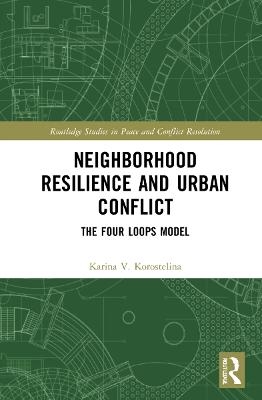
Neighborhood Resilience and Urban Conflict
The Four Loops Model
Seiten
2021
Routledge (Verlag)
978-1-032-06084-2 (ISBN)
Routledge (Verlag)
978-1-032-06084-2 (ISBN)
This book explores resilience in urban neighborhoods affected by chronic conflict and violence, developing a new model for developing resilience.
This book explores the resilience in urban neighborhoods affected by chronic conflict and violence, developing a new model for improving resilience policies.
The neighborhood resilience approach is an inclusive form of building positive resilience, which recognizes that local communities possess valuable skills and experience of dealing with crises, and prioritizes the agency of local communities in the production of knowledge and developing practices. The book identifies and describes the repertoire of neighborhood resilience practices organized in four clusters: (1) addressing the structure of conflict; (2) increasing the effectiveness of external resources; (3) enhancing the community capacities; and (4) reflecting the dynamics of identity and power in neighborhoods. One of the key findings of the book is the nonlinear connections between structure and dynamics of conflict and neighborhood resilience practices represented in the Four Loops Model. The concentration on community-based practices addresses macro-level critiques of neo-liberalism in critical resilience studies and encourages rethinking the ways community-based indicators might operate in combination with existing macro indicators of resilience. The bottom-up indicators provide more specific details and essential localized experiences for improving resilience policies at the national level.
This book will be of much interest to students of conflict resolution, resilience, urban studies, and US politics.
This book explores the resilience in urban neighborhoods affected by chronic conflict and violence, developing a new model for improving resilience policies.
The neighborhood resilience approach is an inclusive form of building positive resilience, which recognizes that local communities possess valuable skills and experience of dealing with crises, and prioritizes the agency of local communities in the production of knowledge and developing practices. The book identifies and describes the repertoire of neighborhood resilience practices organized in four clusters: (1) addressing the structure of conflict; (2) increasing the effectiveness of external resources; (3) enhancing the community capacities; and (4) reflecting the dynamics of identity and power in neighborhoods. One of the key findings of the book is the nonlinear connections between structure and dynamics of conflict and neighborhood resilience practices represented in the Four Loops Model. The concentration on community-based practices addresses macro-level critiques of neo-liberalism in critical resilience studies and encourages rethinking the ways community-based indicators might operate in combination with existing macro indicators of resilience. The bottom-up indicators provide more specific details and essential localized experiences for improving resilience policies at the national level.
This book will be of much interest to students of conflict resolution, resilience, urban studies, and US politics.
Karina V. Korostelina is Professor and Director of the Peace Lab on Reconciling Conflict and Intergroup Divisions at the Carter School for Peace and Conflict Resolution, George Mason University, USA.
Acknowledgements
List of figures
List of tables
Introduction
1 Resilience in neighborhoods facing persistent conflict
2 Structure of conflict in disadvantaged neighborhoods
3 External resources of neighborhood resilience
4 The dynamics of identity and power in neighborhoods
5 Community capacities of neighborhood resilience
6 The practices of resilience
7 Four Loops Model of resilience
Conclusion and practical recommendations
Bibliography
Index
| Erscheinungsdatum | 25.10.2021 |
|---|---|
| Reihe/Serie | Routledge Studies in Peace and Conflict Resolution |
| Zusatzinfo | 4 Tables, black and white; 3 Line drawings, black and white; 4 Halftones, black and white; 7 Illustrations, black and white |
| Verlagsort | London |
| Sprache | englisch |
| Maße | 156 x 234 mm |
| Gewicht | 399 g |
| Themenwelt | Sozialwissenschaften ► Politik / Verwaltung ► Europäische / Internationale Politik |
| Sozialwissenschaften ► Soziologie | |
| ISBN-10 | 1-032-06084-0 / 1032060840 |
| ISBN-13 | 978-1-032-06084-2 / 9781032060842 |
| Zustand | Neuware |
| Informationen gemäß Produktsicherheitsverordnung (GPSR) | |
| Haben Sie eine Frage zum Produkt? |
Mehr entdecken
aus dem Bereich
aus dem Bereich
Studienbuch
Buch | Hardcover (2023)
De Gruyter Oldenbourg (Verlag)
CHF 62,90
Amerikas Strategie der Vorherrschaft und der Kampf um Eurasien
Buch | Softcover (2024)
NOMEN Verlag
CHF 27,95
erfolgreiche Interessenvertretung durch Prozesskompetenz im komplexen …
Buch | Hardcover (2023)
Wiley-VCH (Verlag)
CHF 58,75


